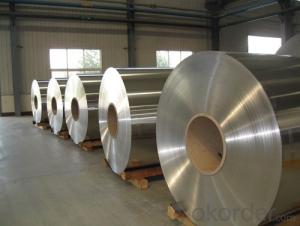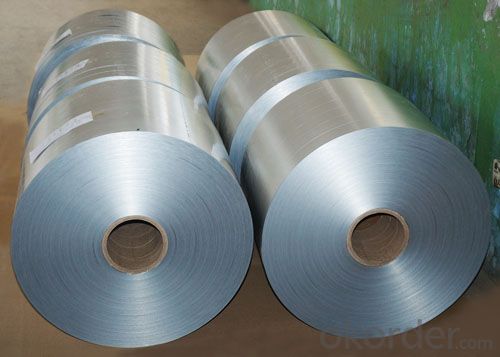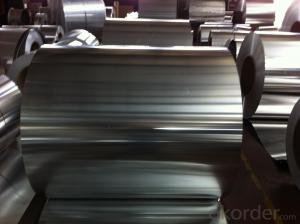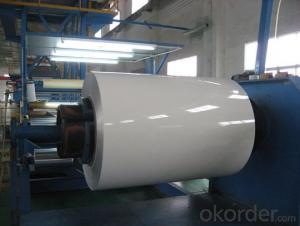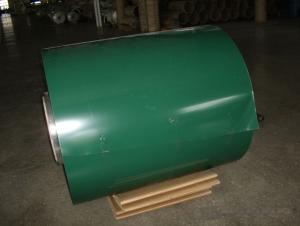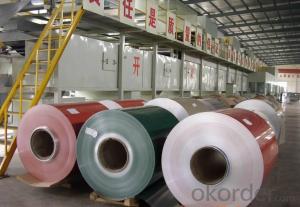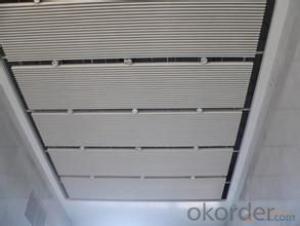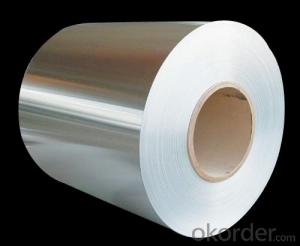Aluminum Coil Minnesota 1100 Alloy for Roofing/Ceiling/Gutter/Decoration
- Loading Port:
- Shanghai
- Payment Terms:
- TT OR LC
- Min Order Qty:
- 2 m.t.
- Supply Capability:
- 70000 m.t./month
OKorder Service Pledge
OKorder Financial Service
You Might Also Like
Specification
Alloy 1100 Aluminium Coil for Roofing/Ceiling/Gutter/Decoration
Specification
Grade
| 1000 Series: 1050 1060 1070 1100 1200 1235 etc. 3000 Series: 3003 3004 3005 3104 3105 3A21 etc. 5000 Series: 5005 5052 5083 5086 5154 5182 5251 5754 etc. 6000 Series: 6061 6063 6082 6A02 etc. 8000 Series: 8006 8011 8079 etc. |
Thickness | 0.05~10mm |
Width | <1600mm< span=""> |
Color | Metallic, Solid, RAL or by customer requirements |
Coating paint: | PVDF(Polyvinylidene Fluoride), PE(Polyester ) |
Coating thickness | as per customer’s request |
Gloss | 10-90%(EN ISO-2813:1994) |
Total coating thick | Polyester18~25micron(EN ISO-2360:1995) PVDF25 ~35micron(EN ISO-2360:1995) |
Coating hardness | 2H |
Protective film | PVC film, Colorless transparent or White-black |
Adhesion | 5B (EN ISO-2409:1994) |
Impact resistance | No cracking and peeling (A.S.T.M D2794-1993) |
Flexibility (T-bend) | 0T- 2T |
Temper | H16, H18, H24, H26, H26 |
Certification | ISO9001:2000, CE, SGS |
Coil's standard diameter | 1100mm |
Inner Diameter | 405mm/505mm |
Coil's standard weight | 2000kgs |
Payment | L/C ,T/T |
Packing
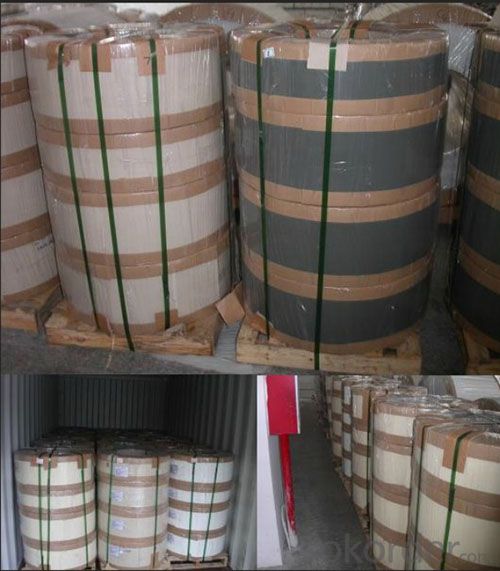
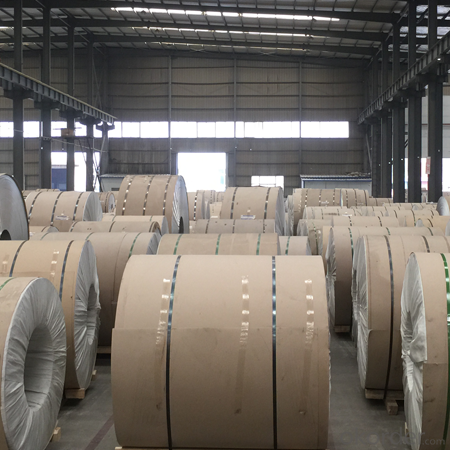
FAQ
Q: How can I request a product sample? A: The samples are free but freight should be collected. Please send sample list and courier account number by email.
Q: How can I request a product catalog? A: The hard copies of catalogs are free but freight should be collected. Please send courier account number by email. You are suggested to request a PDF catalog.
Q: Wha's your payment terms? A: One is T/T 30% before production and 70% against copy of B/L; the other is Irrevocable L/C 100% at sight.
Q: What's your trade terms? A: FOB, CNF(CFR), CIF, EXW.
Q: How long is the quality guarantee? A: All of our products have a period of quality guarantee since time of shipment. Please contact your salesman for more details, as different products enjoy different time of guarantee
- Q: What’s the standard of tensile strength and ductility of aluminum coil 3003?
- Detailed description can help resolve problems quickly. Performance and status is a related. As aluminum coil is usually semi-hard, the tensile strength is greater than or equals 150, ductility is greater than or equals 12.
- Q: Just want to know for any boat builders out there. I have been told by my local paddling store that there are no aluminum kayaks. Why couldn't i build one? it cant be weight, I would build the frame from 1/2 inch square aluminum tubing and the body out of 1/32 high grade sheeting. So why does something like this not exist?
- Aluminum kayaks have been built. Few amateur builders know how to weld much less weld aluminum. Ideally you would need female molds and a press. Stretch forming can harden the aluminum and eliminate the need for a frame. If you make male molds, you could force form deck and hull parts and then join them. Read about amateur airplane builders. The big concern with an aluminum kayak is its tendency to stick to river rocks. Every whitewater run has devoured scores of aluminum canoes. Steel is possible.
- Q: What is an aluminum coil and what is it used for?
- An aluminum coil is a long, flat, and thin sheet of aluminum that is rolled up into a coil shape. It is typically made from high-quality aluminum alloys that are durable, lightweight, and corrosion-resistant. Aluminum coils have a wide range of applications across various industries. One of the most common uses is in the manufacturing of aluminum products, such as cans, containers, and packaging materials. The flexibility and malleability of aluminum coils make them ideal for shaping into different forms and sizes. Additionally, aluminum coils are extensively used in the construction industry for various purposes. They are commonly used for roofing, siding, gutters, and other exterior applications due to their ability to withstand harsh weather conditions and resist corrosion. The lightweight nature of aluminum coils makes them easier to handle and install, reducing labor and transportation costs. Moreover, aluminum coils are also used in heating, ventilation, and air conditioning (HVAC) systems. They are utilized in the production of condenser and evaporator coils, which are crucial components for controlling temperature and humidity in residential, commercial, and industrial buildings. In summary, an aluminum coil is a versatile and valuable material that finds widespread use in numerous industries. Its lightweight, corrosion-resistant, and malleable properties make it an excellent choice for manufacturing aluminum products, as well as for construction and HVAC applications.
- Q: How do aluminum coils contribute to the sound insulation of buildings?
- The unique properties and applications of aluminum coils contribute significantly to the sound insulation of buildings. Being lightweight and flexible, aluminum can be easily shaped into coils, making it an excellent choice for sound insulation purposes. One way in which aluminum coils contribute to sound insulation is by serving as a barrier that prevents the transmission of sound waves. When installed in walls, ceilings, or floors, these coils create an additional layer that effectively blocks and absorbs sound energy. Due to its high density and rigidity, aluminum can reflect and absorb sound waves, thus reducing their intensity as they pass through the building structure. Moreover, aluminum coils can be combined with other soundproofing materials, like foam or fiberglass, to enhance their sound absorption capabilities. By working in conjunction with these materials, aluminum coils create a more comprehensive sound insulation system that traps and dampens sound waves. Another advantage of aluminum coils is their resistance to moisture and corrosion, which makes them suitable for both indoor and outdoor applications. This durability ensures that the sound insulation provided by aluminum coils remains effective over time, even in harsh environments. Additionally, aluminum coils are easy to install and maintain, making them a cost-effective solution for sound insulation in buildings. Their lightweight nature allows for effortless transportation and handling, while their flexibility enables them to be installed in various positions and configurations. To summarize, aluminum coils play a crucial role in sound insulation by acting as a barrier, reflecting and absorbing sound waves, and providing durability and versatility. Their combination with other soundproofing materials further enhances their effectiveness. With their lightweight and flexible properties, aluminum coils offer a practical and cost-effective solution for improving the acoustic performance of buildings.
- Q: Is aluminium a safe metal to put in ones mouth without any side effects?
- I just saw a post on Facebook to whiten your teeth....just like professionals. Put salt,baking soda, and toothpaste mixed together. Spread on teeth. Wrap aluminum foil over teeth and let set. So I'm wondering if the aluminum foil at this point leeches into your mouth???
- Q: What are the different surface treatment options available for aluminum coils?
- Aluminum coils have various surface treatment options available, each with its own purpose and unique advantages. Some commonly used options include: 1. Anodizing: Through an electrochemical process, anodizing creates a protective oxide layer on the aluminum coil's surface. This treatment enhances corrosion resistance, improves durability, and allows for coloring options. 2. Painting: By applying different types of paints like polyester, epoxy, or polyurethane, the aluminum coil can have an aesthetic finish while being protected against corrosion. The choice of paint depends on the desired appearance and level of protection needed. 3. Powder Coating: This method involves applying a dry powder to the aluminum coil's surface, which is then cured with heat. It results in a durable and attractive finish that is resistant to chipping, scratching, and fading. Powder coating offers a wide range of color options and can be used in various applications. 4. Brushing: Brushing the aluminum coil creates a brushed or satin finish with visible linear patterns. It is commonly used for decorative purposes, giving the coil a unique and visually appealing appearance. 5. Laminating: Laminating involves bonding a protective layer, such as a PVC film or polyester film, onto the aluminum coil's surface. This treatment provides additional protection against scratches, abrasion, and UV radiation, while also offering customization options. 6. Chemical Conversion Coating: Also known as chromate conversion coating, this method applies a thin layer of chromate onto the aluminum coil's surface. It enhances corrosion resistance, improves paint adhesion, and provides a base for subsequent painting or powder coating. Choosing the appropriate surface treatment option for aluminum coils depends on specific requirements like durability, corrosion resistance, aesthetics, and cost-effectiveness. Seeking advice from experts in the field can help determine the most suitable treatment option.
- Q: A bit of a question for the 1911 experts roaming around here. Per-say someone, who knew their way around a 1911 built one on an aluminum frame. To top it all off, if the finished gun were to be chambered in .38 super... how long would this combination last? I've heard horror stories about aluminum frames, and then I've heard some wonderful things... this question was to see if anyone had ever thought about/done this sort of thing before. Something tells me that Aluminum + .38 super wouldn't last too long... Most informative answer gets the ten point prize as usual.
- Alloy is great for one thing. Making a gun lighter to carry around. If it was something I was going to shoot substantial amounts of ammo through, I would stick with a caliber that is a bit lower pressure-wise. No +P ever! You can expect about half the life a steel frame would give you. There are many 1911's in 38 Super with alloy frames. How many are shot out is another matter. Personally, I really wouldn't worry about it unless you are burning through more than say 100 rounds a month. Even at that, it should be 15 or 20 years before you would have to worry about it. If it's going to be a competition gun, ditch the alloy frame in favor of a steel one. The added weight will help minimize muzzle climb.
- Q: How are aluminum coils protected against corrosion?
- Various methods are utilized to protect aluminum coils from corrosion. One prevalent approach involves applying a protective coating or finish to the coil's surface. This coating acts as a barrier, preventing the aluminum surface from coming into contact with moisture, oxygen, and other potentially corrosive elements present in the surroundings. The coating can take the form of a layer of paint, anodizing, or a specialized protective film. Another technique employed to safeguard aluminum coils from corrosion is alloying. By incorporating small quantities of other metals such as copper or zinc into the aluminum, the corrosion resistance of the alloy is enhanced. These alloyed metals create a protective oxide layer on the aluminum's surface, serving as a shield against corrosion. In addition to coatings and alloying, proper cleaning and maintenance of aluminum coils are essential for corrosion prevention. Regular cleaning helps eliminate any contaminants or corrosive substances that may have accumulated on the coil's surface. This ensures the integrity and effectiveness of the protective coatings or oxide layers in preventing corrosion. Furthermore, the proper installation and sealing of aluminum coils are imperative for corrosion protection. Effective sealing prevents moisture or other corrosive agents from infiltrating the interior of the coil, which can result in corrosion over time. Overall, a combination of protective coatings, alloying, regular cleaning, and proper installation techniques plays a crucial role in safeguarding aluminum coils against corrosion. This ensures their durability and optimal performance.
- Q: Are aluminum coils suitable for aerospace applications?
- Indeed, aluminum coils are well-suited for aerospace applications. The aerospace industry extensively employs aluminum owing to its exceptional characteristics, including its lightweight nature, high strength-to-weight ratio, resistance to corrosion, and commendable thermal conductivity. These attributes render aluminum coils highly suitable for an array of aerospace purposes, encompassing the construction of aircraft structures, wings, fuselage, and engine components. Moreover, the malleability of aluminum coils facilitates their effortless transformation into diverse shapes and sizes, thereby enabling efficient manufacturing and customization. Ultimately, integrating aluminum coils into aerospace applications not only enhances fuel efficiency and diminishes overall weight but also improves performance and durability in demanding environments.
- Q: Are aluminum coils resistant to moisture?
- Yes, aluminum coils are highly resistant to moisture. Aluminum has a natural oxide layer that forms on its surface, which acts as a protective barrier against moisture and prevents corrosion. This makes aluminum coils an excellent choice for applications where exposure to moisture is a concern, such as in HVAC systems or outdoor equipment.
Send your message to us
Aluminum Coil Minnesota 1100 Alloy for Roofing/Ceiling/Gutter/Decoration
- Loading Port:
- Shanghai
- Payment Terms:
- TT OR LC
- Min Order Qty:
- 2 m.t.
- Supply Capability:
- 70000 m.t./month
OKorder Service Pledge
OKorder Financial Service
Similar products
Hot products
Hot Searches
Related keywords
